***
N. China
Day 3 - 1st November - Taishan: Dai Miao (Part 1)
The woman sitting opposite me on the train thought I lived in Tai'an (the town at the foot of Taishan). So maybe my Mandarin wasn't that bad after all.
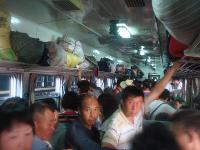
Getting off was a bit less crowded than this

Rock at Taishan train station (though the station is in Tai'an, it's named after the mountain): "五嶽獨尊" ("五岳独尊" - "Most Respected of the Five Sacred Mountains"; of the 5 Sacred Taoist mountains of China, Taishan is the most important [though not the highest])
Happily, the tourist office opened early (I went in before 7:30am). Even more happily, when the girl witnessed my struggles with Mandarin (primarily, looking for the word for "check in"), she said "you can speak English", so breaking my Chinese immersion I did use English some of the time.
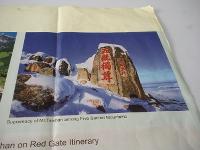
"Supremacy of Mt. Taishan among Five Sacred Mountains"
I wouldn't climb it in winter. I think.
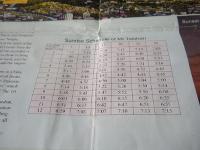
Sunrise schedule
The girl said that there wasn't much difference between the 2 Star and Three Star hotels (later, I found out that it was probably the view - you probably could watch the sunrise from the Three Star joint). So I decided to pay 360¥ instead of 800¥ as it wasn't worth paying more for frills.
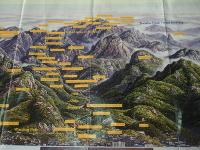
English map
Unfortunately, there were no more copies of the English map (even more unfortunately, I drew on it, not understanding that this was a display copy). The girl did give me a Chinese map, though (which grandmas outside were hawking for 1¥).
I then had breakfast to fortify me for the climb ahead.
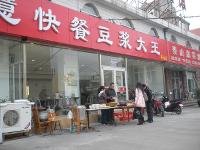
Breakfast place. The guy selling stuff outside, not the joint inside. Notice the sticker for the shop behind - the guy has not one but TWO thumbs up.
The place behind (IIRC) had 排骨面 (pork rib noodles), 牛肉面 (beef noodles) and 炸酱面 (mincemeat sauce noodles), but I figured I could get all of these in Singapore, so I should try other stuff.
A note on Chinese characters:most of the time, I wrote down the hanyu pinyin since it was faster. Hopefully most of the characters posted will be correct; at first I read my notes for the beef noodles as xiu 肉面.

It was really quite cold at 7:42am, but the sweet biscuit and hot residue from making doufu (yes, the doujiang [豆浆] was that tasteless) gave me some degree of comfort. There was actually another liquid available - "小米" (occasional millet pieces floating in hot water), but it didn't look appetising so I passed. Given how tasteless the doujiang was, maybe I should've tried the millet.
I'd a hard seat on the night train from Qufu back to Beijing which I'd bought the morning before, but I decided to try my luck and see what I could from Taishan. After all, there wasn't that much to see in Qufu anyway so I could just as well take a train from Taishan (added bonus: I wouldn't have to haul luggage to Qufu). I was lucky and got a hard sleeper! I'd have to throw away my Qufu 94¥ ticket, but hey it was worth it.
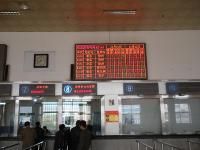
Convenient signboard in train station telling you how many seats are left on the trains. Presumably "无座" means standing room (!)
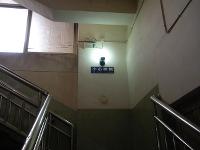
"Be careful in tumble"
I then took the bus to Dai Miao, the famous temple at the foot of the mountain, to pay my respects to the gods before climbing it. It is also a building in Civilization IV.
Sign seen from bus: "Enter the armed forces to
Hotel: "泰山名人酒店" (Taishan Celebrity Hotel). They're following in Mao and Confucius's footsteps.
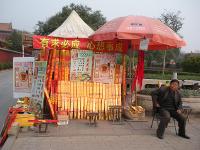
Incense merchant:
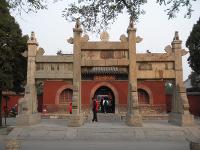
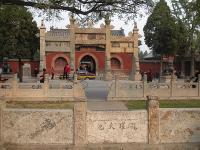
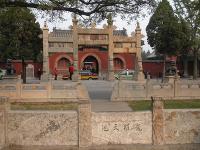
Dai Miao: Yaocan Archway
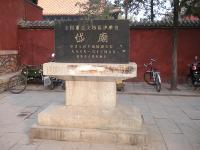
Dai Miao plaque

Entrance
Photography was forbidden inside. Later I discovered that this was just the free-to-enter part of the temple which had [the most?] active worship.
I like to say that what the Japanese took from the Chinese, they improved. I had had a limited dataset before: I hadn't visited really famous temples (I think) in Shanghai in 2007 and besides summer could've made me more critical, and Hong Kong and Macau had minor temples. But Dai Miao (and the other temples and shrines I saw) confirmed that this improvement could be seen for temples.
The temple seemed possibly cheerier than Buddhist ones, with more colours.
In the back courtyard of the free-to-enter part of the temple,there was a four-sided deity with an ingot in each hand. Presumably he was about getting rich.
Sign: "Being civilized earns respect. Politeness starts from me"
Besides the Azure Cloud Goddess, there was also a "送子娘娘" (Mother Goddess who Delivers Sons). Even more amusingly was "眼光奶奶" ("Eyesight Nanny"). I guess I can blame her for my worsening vision due to 眼灭害操 in Nanyang Primary School (the eye exercises we were made to do each morning).
Sign at altar: "每日一供" ("One offering a day"). Maybe blessings are rationed.
I then stumbled across the bigger, more impressive (and, naturally, ticketed) part of Dai Miao.
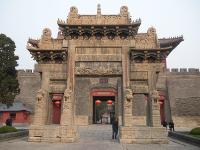
Dai Miao Archway, Zhengguang Gate
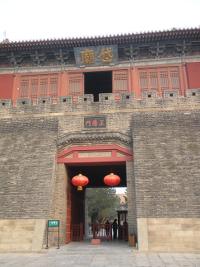
Zhengguang Gate
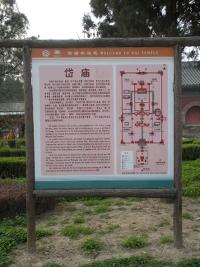
"Dai Temple was listed into the world cultural and natural heritage list in 1987 and proclaimed as the national important cultural relic protection unit in 1988"
Dai Temple plaque. Zhoukoudian had had a AAAA rating; Dai Miao had a AAAAA rating. I wondered if there were any junk bond attractions in China.
Interestingly, the free-to-enter part (in front of the Yaocan Archway) is not labelled on the map.
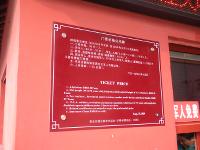
Discounts for "teachers , Provincial model workers,combat model heroes and Moral Model".
Free for "P.L.A soldiers,revolution permanent disability soldiers,over 70 years old people,the disabled,reports"
I was bemused by the 1¥ insurance. I asked the ticket seller and she said very few people bought it.
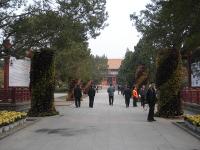
Entrance passage
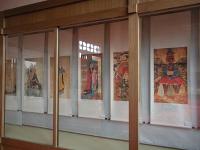

Gods. They are somewhat more colourful than the Buddhist ones
Some people left as offerings for one god Minute Maid and Spring Water. Wth.
I also found out why they were selling insurance:

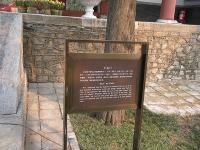
Ren'an Gate: renovations (many other areas were being renovated too, with some parts being dug up)
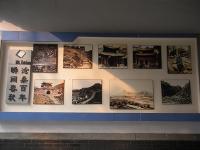
Mount Tai before restoration
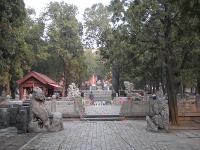
More renovations
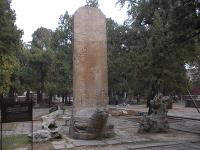
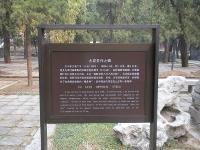
Da Guan Imperial Stela


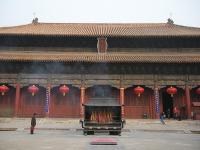
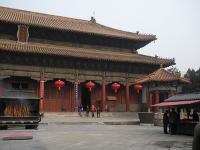
宋天貺殿 - I think this means the hall that was donated in the Song Dynasty. The plaque calls it "Tian Kuang Hall"
In classic Chinese fashion, they had figured out a way to extract more money from visitors - entrants to the hall were required to wear shoe covers. Now, this was perfectly reasonable as the ancient wood needed protection. What was outrageous was tha they were renting shoe covers for 1¥ - and that they got recycled (or at least thrown into a box in semi-good condition) after use. This was on top of the 30¥ admission.
Panorama of Tian Kuang Hall
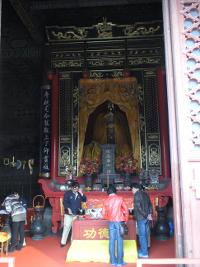
Altar statue of Tian Kuang Hall
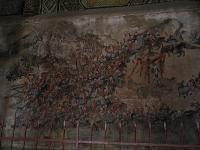
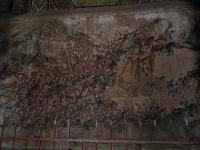
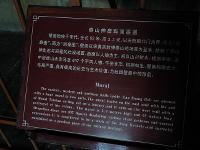
Gorgeous and exquisite Song Dynasty mural
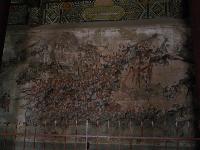
Mural on opposite wall
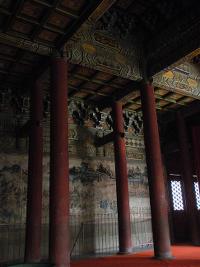
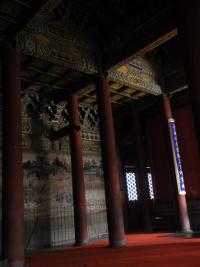
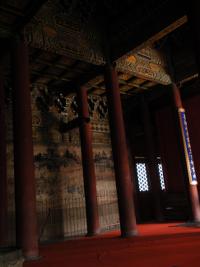
Pillars and ceiling
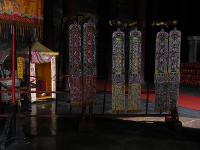
Assorted banners
As I was taking the image above, the staff told me that photography was not allowed, and then promptly offered to sell me a souvenir booklet (45¥) reproducing the image of the mural. I was very suspicious as I hadn't seen any indication that photography was forbidden, so I think they were just trying to stiff me.
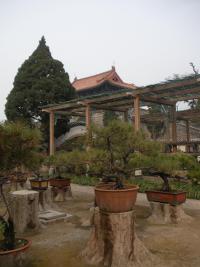
One temple building from the garden
I'd seen quite a few Buddhist monks (in their robes, naturally) walking around this Taoist temple. I'd been expecting horsehair whisk-wielding Taoist priests to appear on the rooftops, swoop down and chase them away, so I asked one (monk, not priest, that is - I didn't see anyone in classic Taoist garb) why this was the case, and he said that they were on holiday.
I wasn't very satisfied with this answer, so I went to ask one of the identification pass-bearing guides, and she gave me a better answer: this temple supported Buddhism and Confucianism as well (she used a word for the latter that I wasn't familiar with, so I only knew what she meant when she said "孔子").
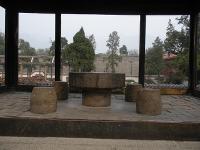
Stone chairs in pavilion
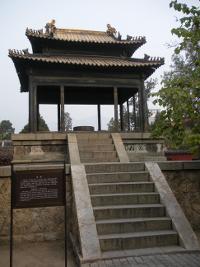
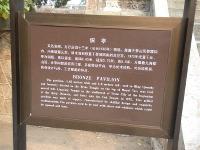
Bronze pavilion

Dangling carved block
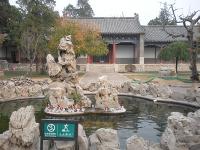
"No walking on water"

Free-standing gate. I assume the signs at the back are for guides to wave around.
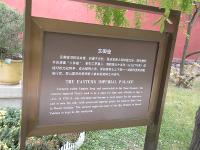
I also had a look at the Eastern Imperial Palace - a palace which Qianlong used

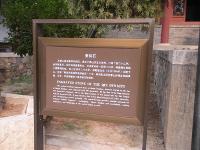
"Engraved stone of the Qin Dynasty" - oldest extant stone on Mount Taishan
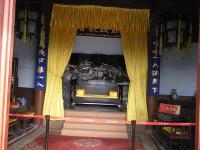
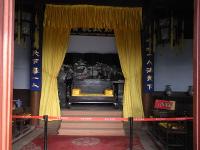
Apart from the throne there was nothing else
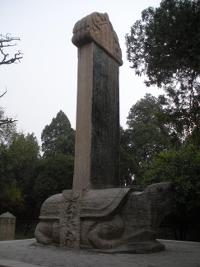
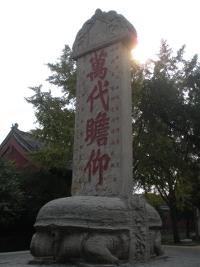
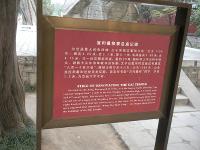
"Stele of Renovating the Dai Temple" aka Tortoise with Penis on its back
In one location I saw 2 attendants staring at a bamboo grove. I asked them what they were doing, and one said they were warming their butts in the sun. Okay.
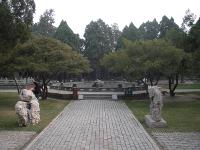

Han Cypress Tree Courtyard

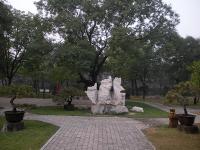

Chinese Scholar Tree Courtyard
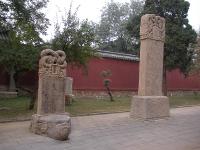
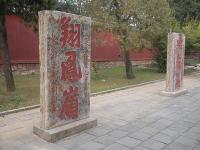
More steles
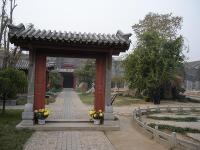
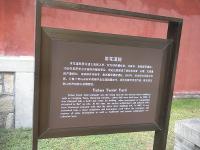
"Yuhua Taoist Yard"

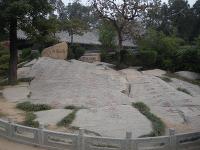
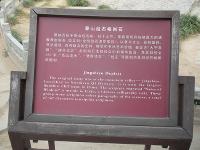
"Jingshiyu Depicts" - Sutra of Wisdom

Another stone bragging about Taishan being the Supreme Taoist Mountain
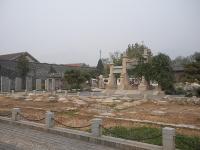
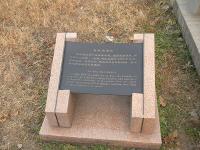
"Lu Ban Hall Relics"
There was also a garden with calligraphy on stones. This idea bemused me, but there you have it - a whole garden full of such.
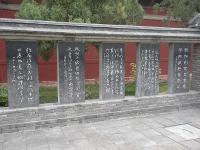
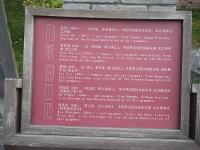
They were all modern - 20th century, and IIRC from the birthdates done in the 2nd half of the century at that. This was because the Ancients were smarter than this.
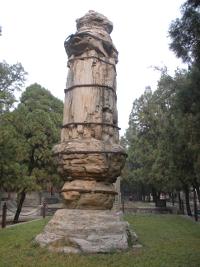
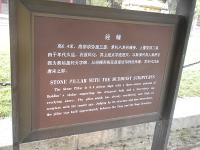
"Stone Pillar with the Buddhist Scriptures"
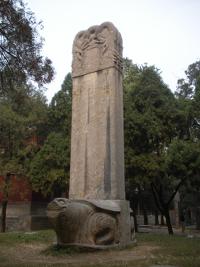
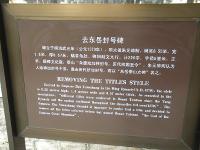
"Removing the Titles Stele"
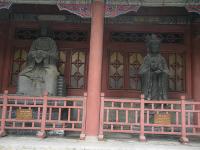
God statues
There was a museum of Han carvings. They were simple and mostly not very nice (because they had been vandalised by you-know-who in the 1960s) but the style was interesting.
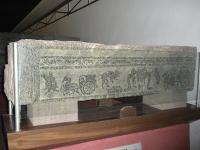
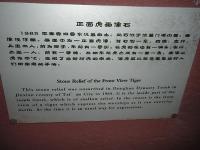
One of the black on black reliefs - "Stone Relief of the Front View Tiger"
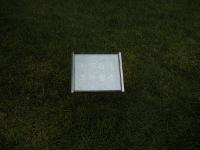
"脚下留情, 草坪留青" ("Your feet leave affection, the grass stays green")
I love all the poetic forms "Keep off the grass" takes.
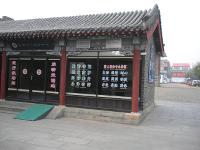
Service centre: "Tourists' service Center Commitment: spontaneous, enthusiastic, patien, standard, considerate, swift, convenient, proper, appropriate"
Virtually all the tourist guides with identification cards (i.e. the accredited ones) are women in their 20s. And a certain type of girl too - quite hiao; at Dai Miao there were 5 women inside a booth for guides and 2-3 of them were doing their makeup with mirrors.
Sometimes, I consider the possibility that I put myself through these ordeals to sustain a mythologised self-image - but then I dismiss this possibility.
I thought the Beijing accent was bad, but some of the people in Shandong were even worse. I asked the women at the ticket check counter at the back exit of Dai Miao how to get to the mountain, and I couldn't understand what she was saying, so I asked her to write it down.


